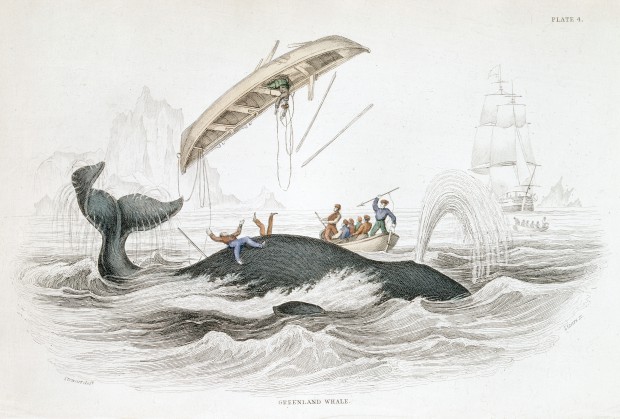Ian McGuire’s second novel is an exercise in extremes: extremes of suffering, violence, environment, language and character. It tells the story of Henry Drax and Patrick Sumner, who we first encounter on the streets of Hull in March 1859. The two men have joined the crew of a whaling vessel, the Volunteer, about to set sail for the Arctic captained by one Arthur Brownlee. Brownlee, renowned for his misfortune at sea, has undertaken the expedition with the largely private intention of wrecking the ship in the waters of the north (motivation: insurance money). Drax is party to his secret plan. Sumner, along with most of the rest of the crew, is not.
The two men, Drax and Sumner, have what look like very different sensibilities. The harpooner Drax, a rapist and a murderer, is a terrifying creation: proudly indifferent to the truth (‘Words are just noises in a certain order’), defiantly thoughtless and unreflective (‘He only acts’), and in thrall to death (inflicting it fills him with ‘arousal, a craftsman’s sense of pride’). Sumner is a former army surgeon who originally hails from Castlebar, Ireland, has secrets in his past, and is ruminative and cultivated. He spends his spare time reading Homer and thinking of Kant, believes in the civilising potential of culture, and insists (borrowing anachronistically from Beckett) that ‘words are all we have’: ‘If we give them up,’ he says, ‘we are no better than the beasts.’
As their expedition moves deeper into the north, McGuire’s narrative moves further into barbarism and chaos. The questions raised by the characters of Sumner and Drax, and by their ceaseless conflict, become more acute. What, the novel asks, lies behind the apparent evil that has visited their journey? Are we elevated and moral beings, or are we really no better than beasts? Where, if anywhere, is God?
McGuire writes around these questions with acuity and curiosity, and without impeding the propulsive force of his narrative. The story grips like a thriller, but does so with an almost unwavering commitment to the high style: a head that has been shot at, for example, ‘explodes in a brief carnation of blood and bone’; a bear in the Arctic ‘rears upwards on its hind limbs . . . and dangles for a moment, suspended like a limestone obelisk against the pelting, moon-stained sky’.
McGuire’s prose is fresh and vivid and his novel as a whole is atmospheric and intellectually fecund. Its surface might be awash with blood; but beneath it flows a current of dark and transporting beauty.






Comments